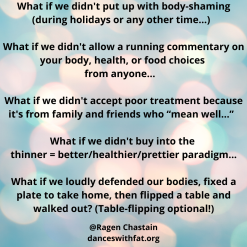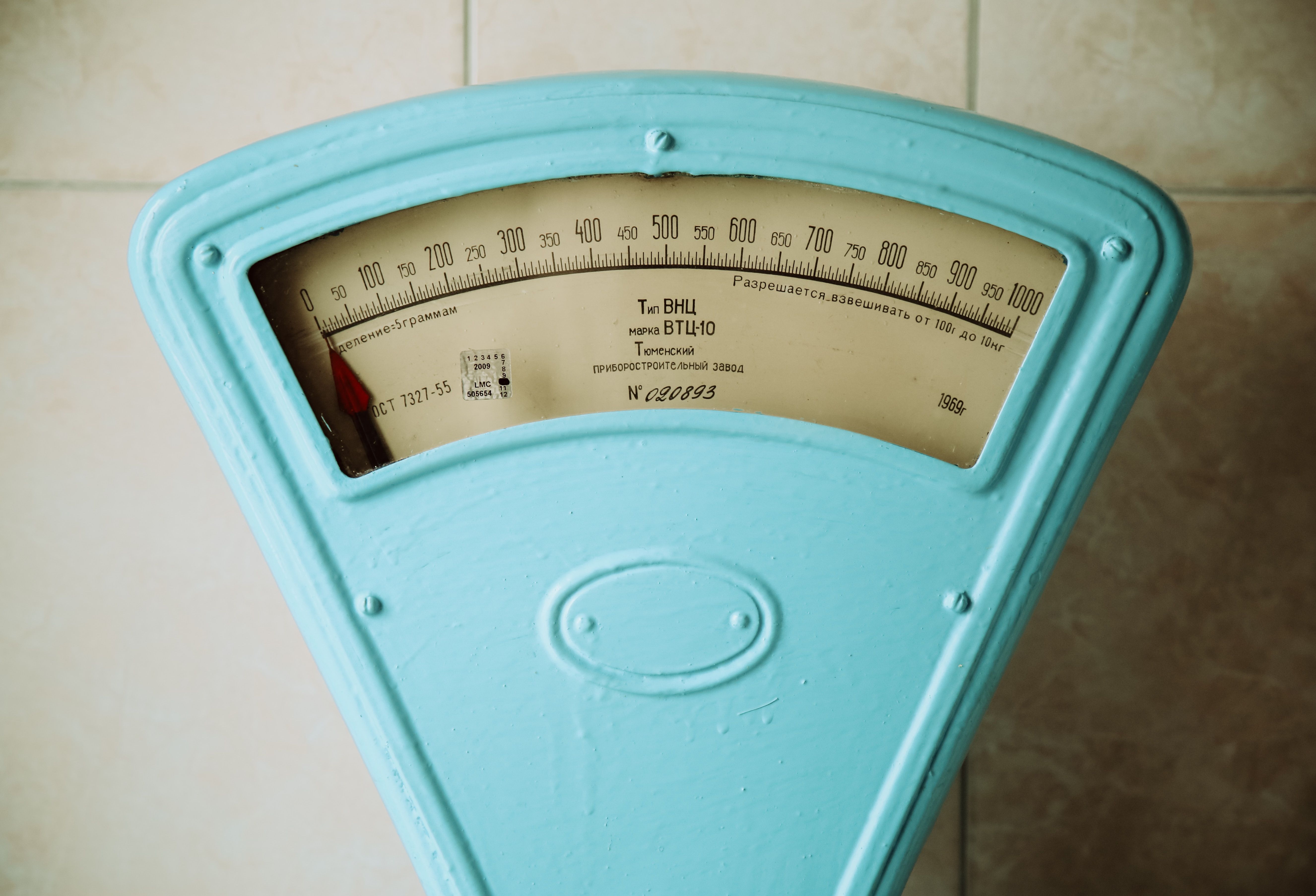by McKenna Schueler
In this ASDAH blog post, McKenna Schueler offers a compassionate framing of weight gain to combat harmful cultural messaging that glorifies weight loss while vilifying weight gain as a ‘problem’ to be fixed. Within, McKenna proposes that allowing your body to gain weight can, in many cases, be protective and serve as an act of self-care and body kindness.
Most people nowadays have some level of awareness of what it means to pursue or engage in some form of ‘self-care’. Unfortunately, this concept which was initially rooted in self-compassion has in recent years been commodified.
That is, if you look to magazines or social media influencers to figure out what self-care is, you’ll find the concept often linked to products and services promoted as one-size-fits-all cures for any number of mental and physical ailments. If you buy this cream, or that subscription box – there’s your self-care.
This proposed requisite of having to buy a product or service to take care of your physical or mental well-being is problematic, to say the least. And it also bleeds into the aesthetic values of diet culture, which glorifies pursuits of shaping, surveilling, and shrinking the body.
Thus, it has become in vogue to find creative ways to pursue weight loss under the guise of #selfcare.
In this way, self-care begins to resemble something closer to bodily harm than body kindness. As a result of whom this media messaging typically targets, this commodified picture of self-care disproportionately reaches women; and by way of medical and institutional bias, has its most nefarious effects on women of color, food insecure populations, disabled folx, and trans folx whose bodies exist beyond the bounds of what has traditionally been conceived of as the “picture of health.”
What isn’t often broached in discussions of self-care, however, is where weight gain can fit. As a young, cisgender woman with a decade-long history of disordered eating patterns, I have had the challenging – yet, perhaps ultimately rewarding – experience of unlearning and relearning what it means to treat my body and general self with kindness.
As a result of having an eating disorder and living in contemporary American society, I’ve had a considerable amount of time to be both drawn into the alluring conception of body-shaping and shrinking as the ultimate #wellnesshack – and fight against it.
As most people who are drawn to Health At Every Size® principles are probably aware, there are many harms and health risks that can occur as a result of disordered eating. People of all sizes who engage in severe patterns of disordered eating or weight-cycling are at risk for facing both medical and psychological consequences. These risks are not limited to people who are classified by the problematic BMI calculation as “underweight.”
Weight gain is commonly framed within media and by bias-holding medical professionals as a “problem to be fixed.” But what about when weight gain is protective, and the choices leading up to them acts of self-nurture? Additionally, why must weight gain (for any reason) be moralized at all? All bodies shift and change with time; it is simply our realities as embodied creatures.
In this post specifically, I will be focusing on weight gain that occurs in response to nourishing and caring for your body after a time of caloric restriction or scarcity. Among people with and without clinical eating disorders alike, it is common for weight gain to occur as a natural response to weight suppression or recent weight loss.
Weight suppression refers to the phenomenon of your weight being below your biological set-point and can happen as a result of:
- having inadequate access to enough food
- chronic dieting
- eating disorders
- medical conditions
Side effects of medications, or significant experiences of stress or sickness, can also cause weight loss in some instances – much to the body’s chagrin.
Within the context of eating disorder recovery, weight gain can be more complex than one’s reaction to seeing a higher number on the scale. Many people (with and without eating disorders) tie weight loss or a smaller body to their identity, their sense of safety, or their value as a person. Learning to re-nourish the body in eating disorder recovery can also be physically uncomfortable, or even painful at times as a result of how the body reacts to increasing or regulating food intake.
The challenges of accepting and embracing weight gain are even more significant for people who occupy a fat body, due to the compounding pressure of messaging coming out of diet culture, biases held by treatment providers, and size discrimination. I recognize that as a person with thin privilege, I am protected from many of these compounding forces of oppression.
Then there are our friends, our family, or whomever we encounter this way or that who take the time to bemoan recent bodily changes. They have also been fed messages about what is “healthy” or “unhealthy,” or how to treat a body that is not pictured as the totally achievable health ideal.
When I propose the idea of reframing weight gain as self-care, I am not proposing that this physical change is the most important part of the body kindness process. When I talked to someone about this angle recently, they said to me: Yes, weight gain can be important for eating disorder recovery [and arguably for many people without an eating disorder], but what else does this mean?
As I understand, what accepting weight gain as a form of body kindness really means is:
- listening to and accepting your body’s needs
- challenging the ways we are conditioned to critique our bodies and instances of weight gain
- challenging fatphobia’s white supremacist, ableist, and xenophobic roots
- embracing the HAES® principle of eating for well-being, and rejecting healthism
Often lost in the continual onslaught of complaints about weight gain are how it can often come as a result of properly nourishing ourselves following sickness, stress, or inadequate access to food.
Not every instance of weight gain is something that someone is actively pursuing, and it may be unexpected. But when we become so fixated on feeding into diet culture’s vilification of weight gain, we neglect how nurturing, and how tender an act it can be to adequately feed our bodies and let them change as they may, if and when we have the resources to do so.
For people who are recovering from an eating disorder or years of dieting, this can be particularly special. It’s not easy to ignore and challenge the mainstream obsession with weight loss or ‘fixing’ our bodies. But is is an act of kindness to ourselves.
The Take-Home Message
Nourishing ourselves doesn’t have to be careful, pretty, gentle, or always even grounded in mindfulness.
Reaching for whatever it is you have available – be it an apple, candy bar, or your favorite food – and feeding yourself sends a message to your body that I am taking care of you, you deserve nourishment, and that will never change no matter how you change or grow.
So, if you would like, I invite you to frame any past, recent, or future weight gain as self-care. I’m right here with you.
McKenna Schueler (She/Her) is a freelance/contract writer with a Bachelors of Arts degree in English and a minor in psychology. McKenna was first introduced to Health at Every Size® and the body liberation movement through the works of fat activists and radical feminist voices online. She hopes to further her education in public health and use her knowledge to help increase federal, state, and community support for inclusive and culturally-competent mental health treatment interventions that respect patient agency. In the meantime, she strives to offer words of compassion and understanding for those who can come away from her writing feeling better informed and/or comforted.



